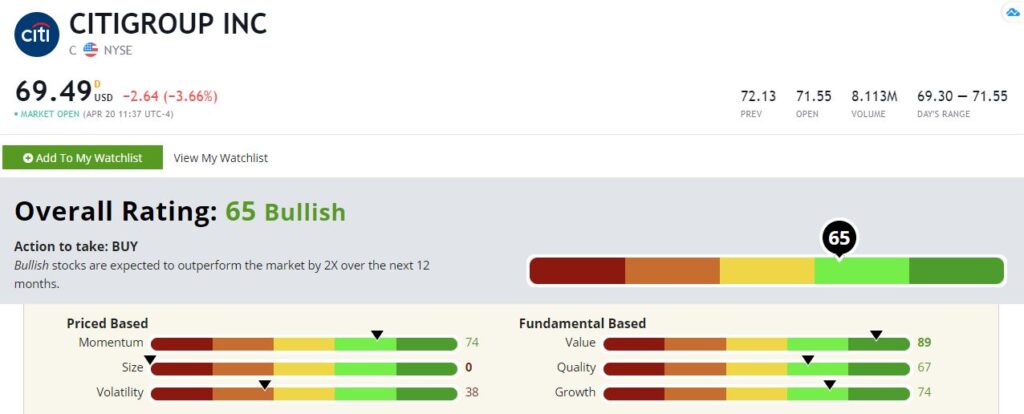Earlier this week, I laid out the bullish case for the “vampire squid,” Goldman Sachs Group (NYSE: GS), noting that banks are a critical piece of the reopening narrative. America’s entrepreneurs are eager to get back to work, and bank financing will make that happen.
As I mentioned in this month’s issue of Green Zone Fortunes, interest rates are giving the banking sector favorable tailwinds for the first time in years. Higher market interest rates benefit banks. A steeper yield curve is an even bigger boon. Banks borrow money, paying cheap (or, let’s face it, nonexistent) rates on deposits, and then lend the money out at higher long-term rates.
This is why I’m bullish on banks.
A Bank Dividend With Growth
Today, we’re going to take a good look at one of the higher-yielding dividend payers in the space, Citigroup Inc. (NYSE: C). At current prices, Citi yields 2.8%. That’s not a “high” payout per se, but remember that the S&P 500 dividend yield is only half that at 1.4%. And, even after rising for months, the 10-year Treasury note yields only 1.6%. So, a 2.8% yield is well above alternatives.
Plus, you know my shtick. I will take dividend growth over yield in most cases. The only way your income stream survives the ravages of inflation is if it regularly grows. And if the banking sector enjoys a strong run in the coming years, dividend growth should follow. Even in a less-than-optimal banking climate, Citi managed to triple its dividend between 2017 and 2019. And I expect a lot more of that to come.
Citigroup’s Green Zone Rating
Citi rates well based on our Green Zone Ratings system, with an overall rating of 65. That’s “Bullish” on our scale, which we expect to double the market’s return over the following 12 months.

Citigroup’s Green Zone Rating on April 20, 2021.
Let’s see what supports that ranking.
Value — Citi rates highest based on value at 89 out of 100. Banks are cheap, and Citi is cheap even by the standards of most banks. Value stocks have done well in 2021. That trend should continue as the economy reopens.
Growth — Despite its cheap valuation, Citi doesn’t slack on growth. The bank rates a respectable 74 out of 100. Don’t be surprised if this rating jumps in the coming years. We’re just now entering a sweet spot for growth.
Momentum — Citi also a 74 on momentum. A quick look at the stock’s chart below explains why. Shares have rocketed higher over the past six months. And there’s no indication of slowing down.
Quality — Banks are handicapped on quality because of high leverage. Still, Citi manages to score a 67 here, placing it above two-thirds of the stocks in our universe.
Volatility — Citi rates a little low on volatility, coming in at a 38 out of 100. Remember, a high score here means low volatility. We’re looking to avoid the kinds of stocks that will give us ulcers. Citi’s score here is lower than I’d like to see. But it isn’t a deal-breaker.
Size — Citi is a large company with a market cap of over $150 billion. It actually rounds down to a 0 out of 100 on our rating scale. You won’t see a small-cap price bounce.
Bottom line: I think Citigroup is a solid addition to any dividend portfolio. But if you’re looking for a more aggressive play on the banking sector, you need to check out the latest issue of our Green Zone Fortunes newsletter. Adam and I think this financial stock will enjoy the best returns in 2021.
While big banks have great profit outlooks, Adam O’Dell and I know the best potential gains lie within small neighborhood chains as life returns to normal. Our April stock selection for Green Zone Fortunes rates a 99 out of 100 in Green Zone Ratings, and we’re convinced it has the potential to double during a three-year holding period!
To find out how you can join our Green Zone Fortunes subscribers with this stock recommendation and many more, check out the details on Adam’s Millionaire Master Class here.
To safe profits,
Charles Sizemore
Editor, Green Zone Fortunes
Charles Sizemore is the editor of Green Zone Fortunes and specializes in income and retirement topics. Charles is a regular on The Bull & The Bear podcast. He is also a frequent guest on CNBC, Bloomberg and Fox Business.






